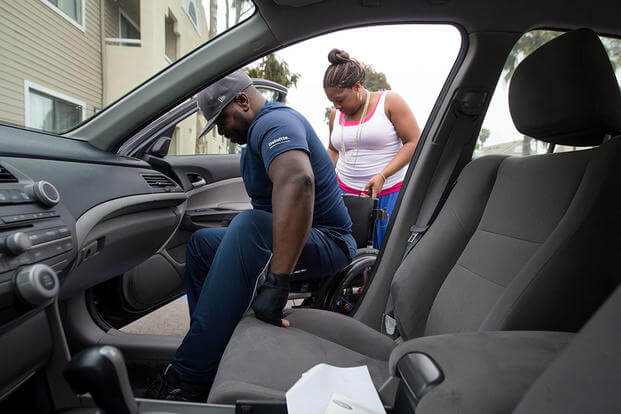The Department of Veterans Affairs on Wednesday will unveil to a select group of veteran and military support organizations changes to a highly scrutinized program that pays family members to provide at-home care to severely injured troops after a review of the system was ordered in mid-April.
The Program of Comprehensive Assistance for Family Caregivers currently pays a monthly stipend of up to $2,500 to caregivers of qualifying post-9/11 veterans, depending on the veteran's needs and location.
But critics of the caregiver program, as it's popularly known, say decisions on who to keep or drop and who to accept are inconsistent, at best. Some caregivers reported being removed from the program even though their veterans' conditions had gotten worse. Others said they were rejected despite meeting all of the criteria.
VA Secretary Dr. David J. Shulkin ordered, and then later extended to late this month, the initial three-week review to "evaluate consistency of revocations in the program and standardize communication with veterans and caregivers nationwide," he said in an April 18 statement.
Now advocates hope the proposed changes, which will be previewed at a meeting with VA officials Wednesday, will address some of those issues.
"We believe super strongly that there has to be a consistent basis of criteria used. Right now, we know that's very loose and inconsistent," said Steve Schwab, executive director of the Elizabeth Dole Foundation, which advocates for caregiver support. "Evaluations absolutely have to be consistent, and right now they're not. We think and hope that's one of the things we'll see in the directive tomorrow."
Shulkin ordered that no veterans and caregivers be dropped during the program review. Sources said they anticipate new program guidelines to be released publicly as early as next week. A VA spokesman said the review is ongoing and declined to confirm the upcoming meeting or plans to release recommendations from the review.
Officials with the Disabled American Veterans (DAV), which long has worked with the VA on caregiver issues, said they are hopeful the review has produced a directive standardizing how the program is operated. A key issue, they said, is cutting down on what is seen by caregivers as "arbitrary" decisions about who and who does not qualify.
"We had asked for this directive for such a long time, and we think they are very close to issuing it," said Adrian Atizado, DAV's deputy national legislative director. "We have come up with a number of recommendations that we wanted them to consider from DAV's perspective that would help them address the arbitrariness in the program."
Such a directive, Atizado noted, can be made within the VA without congressional approval, drastically cutting down the time it would take to implement changes.
Over the course of the review, the VA has held town hall-style meetings both in person and over the phone with veteran and military service organizations, as well as interested caregivers, Schwab said. Officials also have reached out to the veteran and military service organizations for input and help, Atizado said.
Meanwhile, a coalition of 30 veteran and military organizations, including the Elizabeth Dole Foundation and the DAV, are actively lobbying for Congress to expand the caregiver program to include veterans of all eras, a move deemed too expensive in the past. But officials with those organizations say paying at-home caregivers is far less expensive than providing long-term institutional medical care.
The group submitted a letter to members of Congress last week urging them to pass legislation for the change.
"Correcting the existing inequity for pre-9/11 veterans and their caregivers would not only be the morally right thing to do, it would also be the financially responsible course of action," the letter states.
A new DAV report released June 19 found that paying a family caregiver would cost $37,000 a year, compared to a $333,000 annual cost per-patient at a VA nursing home and $88,000 at a community nursing home.
Expanding the benefit could cost between $3 billion and $4 billion over the first five years, according to some estimates. The VA calculates as many as 80,000 pre-9/11 veterans would qualify for the expanded program.
The current program has a budget of $735 million this year and covers about 36,000 users.
-- Amy Bushatz can be reached at amy.bushatz@military.com.






























